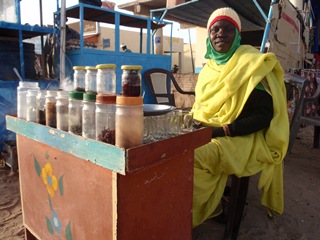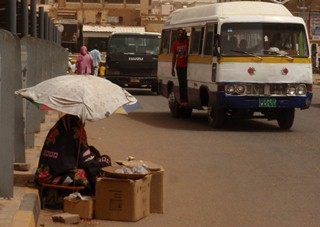FEATURE: Women in Khartoum’s informal job market face struggle for rights
By Kate McIntosh
May 26, 2013 (KHARTOUM) – Gisma Abdel el-Shafe dreams of one day owning a house of her own.

Shafe is one of thousands of Sudanese and migrant women who work in Khartoum’s informal labour market – as tea ladies, dressmakers, or as street vendors selling nuts, sweets and grilled meat.
They work by the roadside, in parklands, along the banks of the Nile and inside the city’s sprawling souqs (markets).
Their hands are constantly in motion, stitching cloth, turning meat, expertly spooning sugar into slender glasses; their workplace often little more than a shaded sliver of pavement.
These small makeshift businesses – particularly the sitta shai (tea ladies) – are a ubiquitous site in Khartoum, providing some much needed gender balance to the city’s crowded streets.
However, the women’s visibility on the street and the fact that their work is often carried out in male-dominated areas also leaves them vulnerable to exploitation and harassment along gender and ethnicity lines.
Shafe has been selling strips of spiced barbecued t to shoppers and traders in North Khartoum’s Bahri souq for the past three years. She earns between 30 and 40 (about $7-$9) Sudanese pounds a day.
She previously worked as a tea lady for one year, but quit after suffering sexual harassment.
Married with one daughter, Shafe, who lives in Omdurman, makes a daily four-hour return trip to her workplace on the other side of Khartoum.
All that she makes goes towards rent and food for her family, with nothing left over for the house she dreams of buying.
“It is never enough. As soon as I make the money, it is gone again”, she says.
EDUCATING FOR CHANGE
Shafe was among 49 women who recently completed a training course aimed at empowering women working in the informal business sector in the Omdurman and Bahri areas.
The course was run by the Institute for Development of the Civil Society (IDCS) and funded by the British embassy in Khartoum.
As part of the project, small-scale female business operators were educated about their rights so that they could better defend themselves against unscrupulous practices or other inappropriate treatment based on their gender.
A report by IDCS found that economic pressures and the high cost of living are increasingly driving more women into the informal labour market, in order to support their families.
However, in Sudan’s heavily segregated and conservative society, their work is still considered lowly, even shameful.
Many women working in the sector faced early or forced marriages, while others live in a grinding cycle of poverty on the peripheries of the Sudanese capital, having escaped conflict in the war-torn regions of Darfur and the Nuba Mountains.
NO CHOICE
Nor Salih Gabreel was just 12 years old when she came home from school to find that her parents had married her off to a much older man without her consent.
Barely able to comprehend the gravity of the situation, she went outside to play while the negotiations for her impending marriage were finalised. By 15 she was divorced and left alone to raise her two young sons.
Now 38, Gabreel, who has never remarried, runs a small tea and coffee business in Bahri. She earns between 300-400 Sudanese pounds (about $68-$91) a month, which helps support 18 members of her family.
In an interview with Sudan Tribune, she says she is still deeply scarred by the loss of her childhood.
“The base of all my difficulties and all of my struggles in life come from this (early marriage). This experience still affects me psychologically; I feel very sad about this situation. I sometimes ask myself why all of this happened to me without having had any choice”, she said.
Gabreel, who has a degree in Islamic studies, had hoped to be a teacher, but economic hardship eventually drove her into the informal labour market after she was unable to find work.
AUTHORITIES CRACKDOWN
The tenuous financial situation facing many women in the sector is further strained by the hefty fees charged by locality authorities for the rent of chairs and equipment, as well as other services.
IDCS’s Nuha Muhamed said some of the fees were to cover cleaning and sewerage costs, but in reality the women received little in the way of support or services in exchange.

Muhamed said the fines are not fixed and the system is prone to corruption and abuse.
Sudan Tribune recently observed several locality officials laughing as they loaded equipment confiscated from two tea ladies in Burri onto a truck.
As they drove off the women chased after the vehicle, shouting for officials to stop and banging the sides of the truck.
Muhamed said that in most cases women were largely unaware of their rights and duties, as well as the laws and regulations affecting their work.
As a result, many women in the informal labour market remain vulnerable to abuses of power, negative social perceptions, discrimination, harassment and other forms of gender-based abuse.
Those selected for the pilot training program came from a range of different backgrounds and included both university educated and illiterate women.
Significantly, the common theme of the women’s stories remained economic hardship brought on by personal circumstances outside of their control.
“IT IS NOT EASY”
Gabreel says she struggles daily with sexual harassment because of her work.
“It is not easy. This is not a respectable profession and people think that we are not nice ladies because we work on the street and with men. They say a lot of bad things”, she told Sudan Tribune.
“But it makes me stronger because I know that I am doing this to support my family. I say to those people that they shouldn’t say bad words [to others] without even knowing them”, she added.
Muhamed said that there are plans to expand the training program and it is hoped that in the long-term educating women would help ensure a more equitable enforcement of laws and regulations governing the informal business sector, as well as develop cultural sensitivity and promote women’s access to justice.
(ST)
